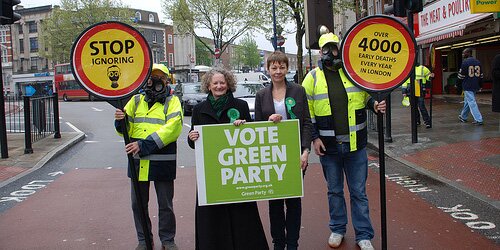The chart that shows why our economy needs fundamental reform
8:45 am - March 19th 2013
| Tweet | Share on Tumblr |
New figures from the ONS yesterday demonstrate the extent of the squeeze on middle income households.
The below chart really is quite telling:

This picture is a familiar one – a trend noted many times before by the TUC and the Resolution Foundation amongst others.
The ONS today note that:
Since the start of the economic downturn, original income for this middle fifth has fallen by 8.8%, once inflation is taken into account, driven largely by a reduction in income from earnings. However, an increase in the amount of income received through cash benefits and a fall in the proportion of income paid in taxes has meant that disposable income for this group has fallen by only 3.8% in real terms.
Five things are worth noting from this release:
This problem pre-dates the 2008 crash. As is very clear from the chart above, median household incomes begin to stagnate in the mid 2000s.
Things have got worse since. The data release today only runs until fiscal year 2010/11. The bulk of the cuts in tax credits and other social security benefits enacted by the Coalition are not included in this data. Nor are the real wage falls of 2011/12 or 2012/13.
The coming Budget won’t do much for living standards. It seems likely that the coming Budget will be billed as a ‘living standards budget’ with the centre-piece being a further rise in the personal allowance. However as TUC research published today demonstrates families on all income levels are losing more from the rise in VAT than they gain from the increase in the personal allowance. A real budget focussed on living standard as would include a cut in VAT.
Predistribution matters. In the period 2007/08 to 2010/11 the biggest factor driving down household living standards was the fall in real wages. Rising living standards requires changes in the tax and benefit system but also stronger wage growth.
This is bad for the wider economy. For reasons I’ve outlined before, if we want a stronger, more sustainable recovery it has to be underpinned by rising household incomes.
| Tweet | Share on Tumblr |  |
Duncan is a regular contributor. He has worked as an economist at the Bank of England, in fund management and at the Labour Party. He is a Senior Policy Officer at the TUC’s Economic and Social Affairs Department.
· Other posts by Duncan Weldon
Story Filed Under: Blog ,Economy
Sorry, the comment form is closed at this time.
Reader comments
Hmm. But what if, as with Germany a decade back, the problem is actually that British labour is too expensive? That productivity levels don’t justify the wage levels?
Then the solution is, as with Germany a decade back, for productivity to rise while wages stay static or even fall.
Strangely, the German unions not only noted this point they actually worked with employers to restrict wages rises so that the two, wages and productivity, would come back into line.
Wouldn’t it be wonderful if the UK had a union movement willing to do what’s good for the economy in the same manner?
Yes, it might be wonderful. It would also be wonderful if the PLC directors were willing to take a haircut as well. But, no, don’t be silly. That would be like saying that incompetent failed directors shouldn’t get massive golden handshakes when they are sacked.
You can’t expect unions and workers to behave that way, when their wealthier bosses do not.
Quite. What has been the effect on buying power?
We have benefited from cost of living decreases in many areas over the last several years; technology, clothing and food being the obvious. It has been possible to live much more cheaply than before, dependent on what you want to do and buy.
The cost decreases came from cheap labour in the developing world, rather than additional effort or innovation on our own part.
Did buying power, ie living standards, rise more quickly than was justified? I rather suspect this was the case.
Still nothing to sort out the £11K we all spend on real estate- the UK economy needs to stop running on the housing market, if you crack this back to how normal national economies work, then everything becomes cheaper and:1. The Budget doesn’t need to have subsidies for those able to afford a house (which is anyway excluding the bottom 35% of earners)
2. Labour costs drop, as do office etc costs
Stop subsidising the banks
There are real problems with stagnating wages. But household income is a bit of a problematic stat. Old age, divorse and higher education levels lead to more people living alone for more years of their lives. I live alone on a decent income. With a wife of similar income we’d be wealthy. That social trend goes unrecognized by these stats. But
Reactions: Twitter, blogs
Sorry, the comment form is closed at this time.
NEWS ARTICLES ARCHIVE





















